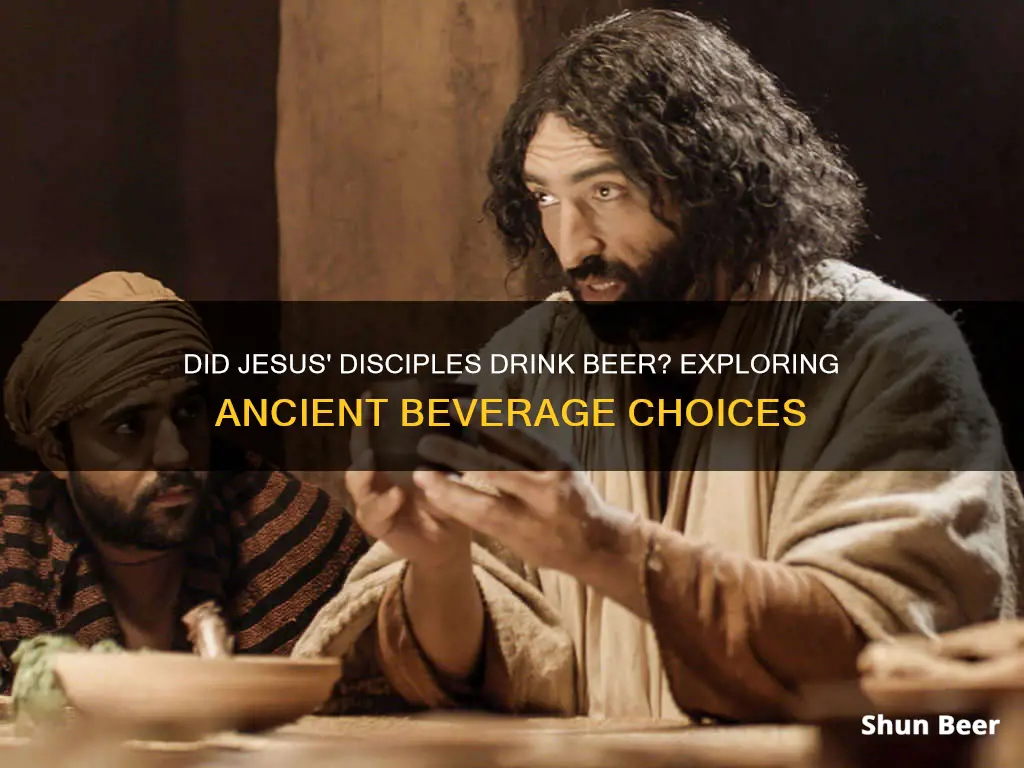
While the Bible does not explicitly mention the disciples drinking beer, it is likely that they did. Beer was a common beverage in ancient times, and the disciples, as followers of Jesus, would have participated in the same cultural practices as him. Jesus was often around wine during his ministry, including at weddings, meals, and the Passover celebration. He is also said to have turned water into wine at the wedding in Cana, indicating that drinking wine was acceptable within the context of his teachings. Therefore, it is reasonable to assume that the disciples, who were Jesus's closest followers, also drank wine and possibly beer.
What You'll Learn

Did Jesus drink alcohol?
The Bible does not explicitly state whether or not Jesus drank alcohol. However, there is evidence to suggest that he did. Firstly, Jesus was not a Nazirite, who are the only group of people in the Bible explicitly told not to drink wine/alcohol (Numbers 6:1–4). Jesus was a "Nazarene," meaning he was from the town of Nazareth (Luke 18:37) but did not take the Nazirite vow.
Secondly, Jesus' first miracle was turning water into wine at a wedding in Cana (John 2:1–11). It is unlikely that Jesus provided only grape juice, as the master of the feast commented that the wine was better than what was served before, and it was apparently "fine" wine (John 2:10–11). The Greek word for "drunk" in John 2:10 is "methuo", which means "to be drunken" or "intoxicated". It is also worth noting that it would have been normal for Jesus to drink wine at the wedding, and Jewish wedding celebrations traditionally included drinking fermented wine.
Thirdly, during the Last Supper, Jesus and his 12 disciples shared bread and wine. The Bible sometimes refers to wine as the "fruit of the vine" (Matthew 26:27–29; Mark 14:23–25; Luke 22:17–18). While some claim that what Jesus drank was grape juice, others argue that the term "fruit of the vine" refers to fresh grape juice and not fermented wine.
Finally, in Luke 7, Jesus himself states that he came "eating and drinking", and the religious leaders of the day accused him of being "a glutton and a drunkard, a friend of tax collectors and sinners" (Luke 7:33–34). However, Jesus was never gluttonous or drunk, as he lived a sinless life (1 Peter 2:22).
In conclusion, while there is no definitive proof, the evidence suggests that Jesus likely drank alcohol in moderation. The Bible explicitly forbids drunkenness (Ephesians 5:18; Romans 13:13; Galatians 5:21; 1 Peter 4:3; Luke 21:34; Proverbs 23:20) but does not prohibit the consumption of alcohol. Christians who want to follow biblical teachings regarding alcohol should drink in moderation or abstain completely.
Drinking Beer in Truck Beds: Is it Legal?
You may want to see also

Did Jesus drink wine at the Last Supper?
The Last Supper was the final time Jesus gathered with his 12 disciples to share bread and wine before his death. The Bible does not explicitly state whether Jesus drank wine at the Last Supper, but it does mention that he drank wine at other times. For example, in Luke 7, Jesus contrasts his own drinking habits with those of John the Baptist, who "came eating no bread and drinking no wine". The religious leaders of the day accused Jesus of being a drunkard, and Jesus never denied these claims—instead, he warned against drunkenness.
There is also evidence to suggest that the wine served at Jewish celebrations, such as the Passover, was fermented. In addition, the Bible sometimes refers to wine as the "fruit of the vine", which some interpret as referring to fresh grape juice rather than fermented wine. However, others argue that the term "fruit of the vine" does not necessarily exclude fermented wine.
Some scholars argue that Jesus would have drunk wine at the Last Supper, as it was customary for wine to be served at Jewish celebrations, and Jesus is known to have participated in other Jewish traditions, such as the Passover celebration. On the other hand, some Christians believe that Jesus only drank unfermented grape juice, as the Bible forbids the Israelites from consuming fermented beverages during the Passover meal.
Ultimately, the Bible does not provide a definitive answer to whether Jesus drank wine at the Last Supper, and the interpretation of this event may vary depending on individual beliefs and religious traditions.
Beer Tolerance: Why Some People Can't Get Drunk Easily
You may want to see also

Did Jesus turn water into wine?
It is commonly believed that Jesus did indeed turn water into wine at a wedding in Cana, as described in the Bible (John 2:1–11). This is considered to be the first of his miracles.
The wedding party had run out of wine, and Jesus' mother, who was also in attendance, asked Jesus to intervene. Initially, he was reluctant, saying, "My hour has not yet come" (John 2:4). However, he then instructed the servants to fill six stone water jars with water, and he turned this water into wine.
The wine Jesus created was of notably superior quality to what had been served earlier in the celebration. The master of the banquet, tasting the wine, remarked that it was better than what had been served previously and that it was unusual to serve the finest wine last.
This miracle holds symbolic significance in Christian theology. Wine in the Bible often symbolizes life, joy, blessing, and prosperity, and in the New Testament, it also represents the blood of Jesus Christ. The transformation of water into wine can be seen as a foreshadowing of Jesus' sacrifice and the new covenant between God and humanity through his blood.
The miracle also demonstrates Jesus' compassion and willingness to intervene in the lives of those around him. By performing this miracle, Jesus ensured the celebration could continue and spared the bridal couple potential embarrassment and financial penalty, as it was customary to have an abundance of wine at weddings, and they would typically sell any leftover wine after the event.
While some interpret this miracle as an endorsement of alcohol consumption, others argue that the focus should be on the symbolic nature of the act and that drunkenness is discouraged in the Bible.
Drinking Beer While Driving in Victoria: What's Allowed?
You may want to see also

Did the disciples drink wine at the Last Supper?
The Last Supper was the final time Jesus gathered with his 12 disciples, or apostles, to share bread and wine before his death. The event is remembered annually by the Christian community with the feast of Maundy Thursday.
There is controversy as to whether Jesus drank wine with alcohol in it at the Last Supper. Some claim that what Jesus drank was not wine but grape juice, or that the drink was not fermented. However, according to Jewish tradition, the Passover celebration, of which the Last Supper was an instance, included the drinking of fermented wine. The Bible sometimes refers to wine as the "fruit of the vine" (Matthew 26:27–29; Mark 14:23–25; Luke 22:17–18).
Jesus was not a Nazirite, who are the only group in the Bible that is explicitly told never to drink wine or alcohol (Numbers 6:1–4). Jesus was a Nazarene, meaning he was from Nazareth. Indeed, Jesus's first miracle was turning water into wine at the wedding in Cana (John 2:1–11). It is safe to assume that he partook in drinking wine in moderation. In Luke 7, Jesus says:
> "For John the Baptist has come eating no bread and drinking no wine, and you say, 'He has a demon.' The Son of Man has come eating and drinking, and you say, 'Look at him! A glutton and a drunkard, a friend of tax collectors and sinners!'".
Here, Jesus is contrasting John the Baptist's abstinence with his own practice of drinking wine. Moreover, Jesus was accused by the religious leaders of his day of being a drunkard, though falsely so.
Jesus also incorporated wine as part of the main rite of Christianity: the Eucharist. Catholic theology regards the Eucharist as a sacrament instituted by Jesus Christ during the Last Supper.
For these reasons, it is likely that the disciples drank wine, not beer, at the Last Supper.
Beer and Blood Work: Is One Drink Okay?
You may want to see also

Was the wedding at Cana wine alcoholic?
The wedding at Cana is the name of the story in the Gospel of John where Jesus performs his first miracle, turning water into wine. The story is used as evidence of Jesus' endorsement of marriage and earthly celebrations, and also as an argument against teetotalism.
The Bible does not explicitly state whether the wine at the wedding was alcoholic or not. However, there are several reasons to believe that it was. Firstly, according to Jewish wedding tradition, fermented wine was always served at weddings. If Jesus had provided only grape juice, the master of the feast would have complained. Instead, he remarked that the wine was better than what was previously served, and it was apparently a ""fine" wine. The Greek word for "drunk" in John 2:10 is "methuo", which means "to be drunken" or intoxicated. The testimony of the master of the feast is that the wine Christ produced was able to intoxicate.
In addition, the Bible does not condemn drinking wine or alcohol. In fact, it discusses wine in a positive light, describing it as something to "gladden the heart of man" (Psalm 104:14-15). While the Bible warns against alcohol abuse and drunkenness, it does not consider drinking wine or alcohol to be inherently sinful.
However, some faith groups, particularly those that reject alcohol, may teach that Jesus made non-alcoholic wine. The Coptic Orthodox Church, for example, teaches that the wine at the wedding at Cana was non-alcoholic.
The Amish and Beer: A Complex Relationship
You may want to see also
Frequently asked questions
The Bible does not explicitly mention the disciples drinking beer. However, it is likely that they drank fermented wine, which was a staple in the ancient world and commonly served at Jewish celebrations and feasts.
Yes, Jesus drank wine, as it was a common beverage in his culture. However, he never condemned anyone for drinking alcohol and always practised moderation.
The Bible does not give a blanket prohibition against alcohol consumption. Instead, it warns against drunkenness and the dangers of living for pleasure in drunken parties (Romans 13:13-14). It encourages believers to live soberly (Titus 2:11-13) and exercise self-control (Galatians 5:22-23).
Yes, Jesus performed his first miracle at a wedding in Cana by turning water into wine (John 2). This miracle symbolised the new creation reality of the new covenant and revealed that our natures can be redeemed through Christ.
Drinking alcohol is a personal choice, and different Christian denominations have varied perspectives on the matter. Some choose to abstain from alcohol completely, while others consume it in moderation. Ultimately, the Bible emphasises the importance of freedom and self-control, ensuring that nothing has power over us (Romans 14:17).







